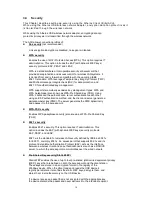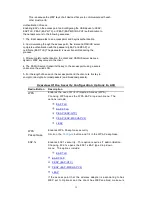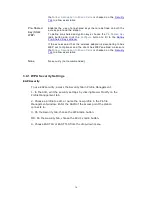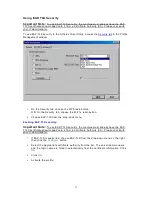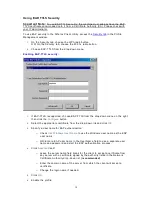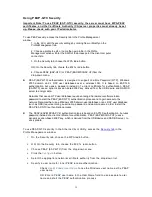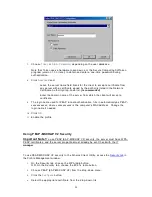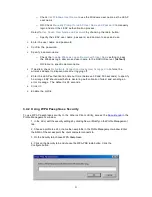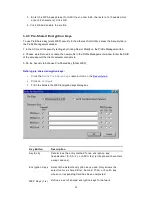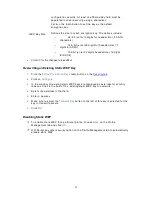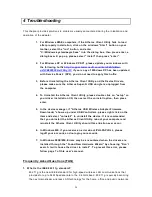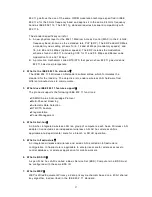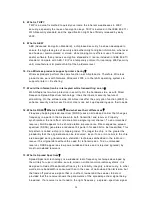
8. What
is
TKIP ?
TKIP i s a qui c k-fi x method to quic kly o ve rcome the inhe rent wea kne sse s in WEP
se cu rity , e specially t he reu se of en c ryp tion ke y s. TKIP i s involved in the IEEE 802.11i
WLA N secu rit y standa rd, an d the spe cification might be of ficially relea sed b y ea rly
2003 .
9. What
is AES ?
AE S (Advan ced Enc ryp tion Stan dard ), a chip-ba sed sec urit y, h a s bee n developed to
en su re the highe st deg ree of se cu rity and authen ticity fo r digital info rmation, whe re ve r
and howe ve r communicated o r sto red , while ma king mo re ef ficient u se of ha rdware
and/ or sof tware than p re viou s enc ry ption standa rd s. It i s al so included in IEEE 802.11i
st anda rd. Compa re with AES, TK IP i s a tempo ra ry p rotocol fo r replacing WE P se cu rity
until manufa ctu re rs implement AES at th e ha rd ware level.
10. Can Wire less pr oduc ts s uppor t pri nter sha ri ng
?
Wirele ss product s pe rf orm the same fun ction a s LA N p rodu ct s. The refo re, Wi rele ss
p rodu ct s can wo rk with Net wa re, Windo ws 2000, o r othe r LA N op era ting sy stem s to
su ppo rt p rinte r o r file sha ring.
11. Woul d the i nforma ti on be i nterce pted w hile trans mi tting on ai r
?
WLA N f eatu re s t wo-fold p rote ction in secu rit y. On the h ard wa re side, a s with Direct
Sequen ce S prea d Spe ct rum te chnology , it ha s the inhere nt secu rit y feat ure of
sc rambling. On the soft wa re si de, WLA N se rie s o ffe r the enc ryption fu nction (WE P) to
enhan ce secu rit y and A cc e ss Cont rol. Use rs can se t it up depending upon thei r need s.
12. What is DSS S
?
Wha t is FHSS
?
And w ha t are thei r di ffere nces
?
Fre quenc y -hopping sp read -spec t rum (FHSS ) u se s a na rro wband ca rrie r that change s
f requen cy in a pat te rn tha t i s kno wn to both t ran smitte r and recei ve r. P rope rly
sy n chronized, the ne t eff ect i s to maintain a single logi cal channel. To an unintende d
recei ve r, FHSS appea rs to be short -du ration impul se noi se. Dire ct -sequence sp read -
sp ect rum (DSSS ) gene rate s a redundan t bit pa tte rn f or each bit to be t ran smitted. Thi s
bit pa tte rn i s called a chip (o r chipping code ). The longer the chip i s, the gre ate r the
p robability that the o riginal data can be re cov ered . E ven if o ne o r mo re bit s in the chip
a re damaged du ring t ran smi ssion, sta ti stical technique s embedded in the radio can
reco ve r th e o riginal data without -the need for ret ran smi ssion. To an unintended
recei ve r, DSSS appea rs a s lo w po we r wideband noi se and i s rejected (ignored ) by
mo st na rro wband recei ve rs.
13. What is Spread Spec trum
?
Sp read Spec trum tech nology i s a wideband radio f requ enc y te chnique de veloped by
the military fo r u se in reliable, se cu re, mi ssion -c ritical communication sy stem s. I t i s
de sign ed to t rade of f band width e fficienc y for reliability, integ rity, and secu rit y. I n othe r
wo rd s, more band width i s con sumed tha n in the ca se of na rro wband t ran smi ssion, bu t
the t rade o ff p rodu ce s a signal that i s, in ef fec t, loude r and thu s ea sie r to dete ct,
p rovided that the re ceive r knows the pa ramete rs of the spread-spe ct rum signal being
b road ca st . I f a re ceive r i s not t uned to the right f requenc y, a sp read – spe ct rum sign al
28

